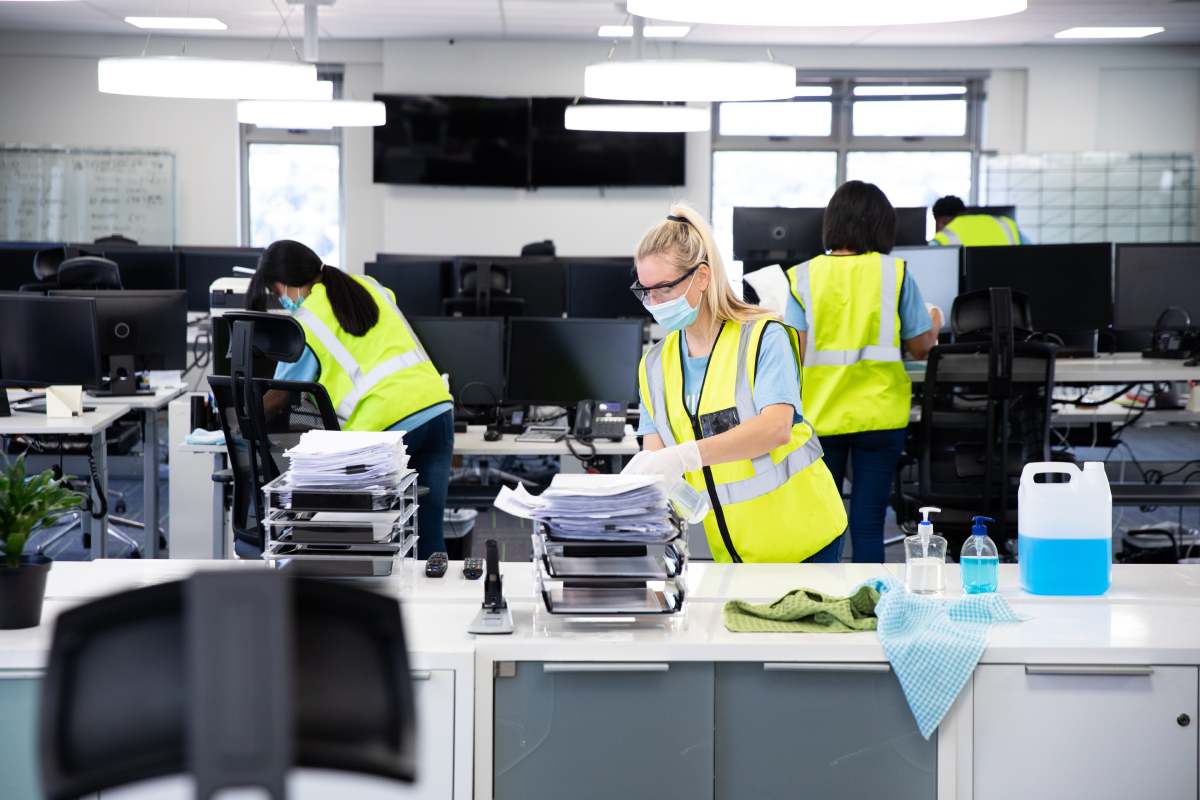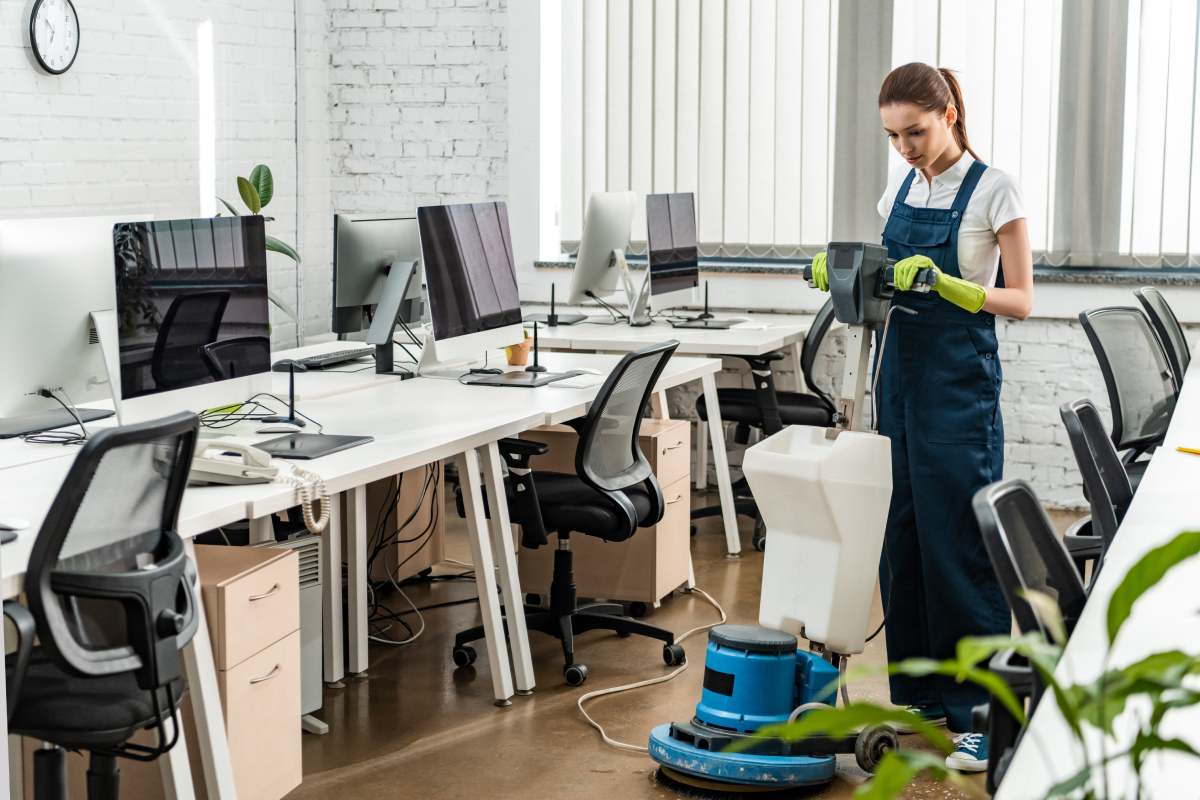Maintaining a clean and organized office is essential for any business, as it directly impacts the health, productivity, and morale of employees. Office cleaning is not just about aesthetics; it plays a crucial role in preventing the spread of germs, creating a professional image, and preserving office equipment. However, the effectiveness of office cleaning largely depends on the frequency of cleaning and the quality of the service provider.
This article explores the benefits of office cleaning, provides guidelines on how often various cleaning tasks should be performed, and offers tips on choosing the right office cleaning service provider to ensure a safe and welcoming workspace.
Related article:
- What is the easiest to clean carpet? How do you keep the carpet in good condition?
- Heat-Reflective Coatings: What Are Its Pros and Cons?
- What Are Replacement Windows? How Much Does It Cost to Replace Windows In Your Home?
How Does Office Cleaning Help?
Office cleaning plays a crucial role in maintaining a productive and healthy work environment. It’s more than just keeping a space looking nice; it has practical benefits that can significantly impact employees and the overall success of a business.
1. Enhancing Health and Reducing Sickness
A clean office helps reduce the spread of germs and illnesses. Surfaces like desks, keyboards, and door handles can harbour bacteria and viruses. Regular cleaning, especially in high-touch areas, reduces the risk of infections. This is particularly important in shared spaces where one sick employee can easily spread germs to others. A cleaner environment means fewer sick days, which can save businesses money and keep operations running smoothly.
2. Boosting Productivity
A cluttered and dirty workspace can be distracting and stressful. When the office is clean and organized, employees can focus better on their tasks. A tidy environment also helps reduce stress, as clutter can make people feel overwhelmed. When employees are comfortable and focused, their productivity naturally increases. Additionally, a clean office can help prevent accidents, such as slips or falls, which can disrupt workflow and cause injuries.
3. Creating a Professional Image
First impressions matter, and a clean office creates a positive one. Clients, partners, and potential employees who visit your office will notice if the space is well-maintained. A clean environment reflects a business’s attention to detail and professionalism. It shows that the company values its employees and clients, enhancing its reputation and potentially attracting more business opportunities.
4. Preserving Office Equipment and Furniture
Regular cleaning can extend the life of office equipment and furniture. Dust and dirt can accumulate in computers, printers, and other devices, causing them to overheat or malfunction. Similarly, stains and spills on furniture can lead to wear and tear. By keeping everything clean, businesses can avoid costly repairs or replacements, saving money in the long run.
5. Improving Air Quality
Dust, allergens, and pollutants can accumulate in an office, affecting indoor air quality. Poor air quality can lead to health issues like allergies, respiratory problems, and fatigue. Regular cleaning, including vacuuming carpets and cleaning air vents, helps remove these particles, resulting in fresher, cleaner air. Good air quality contributes to a healthier work environment, making it easier for employees to breathe and feel comfortable.
6. Enhancing Employee Morale
A clean and pleasant workspace can boost employee morale. When employees see that their employer cares about the cleanliness of the office, it sends a message that their well-being is important. This can increase job satisfaction and loyalty, leading to a more positive work culture. Happy employees are more likely to be engaged, motivated, and committed to their work.
How Often Should an Office Be Cleaned?
The frequency of office cleaning depends on several factors, including the size of the office, the number of employees, the type of business, and specific needs like high-traffic areas or special equipment. However, general guidelines can help determine a suitable cleaning schedule:
1. Daily Cleaning
Certain tasks should be performed daily to maintain a clean and hygienic environment. These tasks typically include:
- Emptying Trash Bins: To prevent odours and the spread of germs, it’s important to empty trash bins daily, especially in common areas and kitchens.
- Wiping Down High-Touch Surfaces: Desks, door handles, light switches, keyboards, and phones are frequently touched and can harbour germs. These surfaces should be wiped down daily with disinfectant.
- Cleaning Restrooms: Restrooms require daily cleaning to ensure hygiene and prevent the spread of bacteria. This includes sanitizing toilets, sinks, and other surfaces, restocking supplies, and taking out the trash.
- Vacuuming and Sweeping: High-traffic areas, such as entrances, hallways, and common areas, should be vacuumed or swept daily to remove dirt and debris.
2. Weekly Cleaning
Some tasks can be scheduled weekly, depending on the office’s usage and needs:
- Dusting: Dust can accumulate on surfaces, shelves, and equipment. Weekly dusting helps maintain air quality and prevents allergies.
- Deep Cleaning of Restrooms and Kitchens: In addition to daily cleaning, a more thorough cleaning of restrooms and kitchens should be done weekly. This includes scrubbing tiles, cleaning appliances, and sanitizing surfaces.
- Mopping Floors: Hard floors should be mopped weekly to remove dirt and stains, especially in areas with a lot of foot traffic.
3. Monthly Cleaning
Certain tasks are less urgent and can be scheduled monthly:
- Cleaning Windows: Windows and glass doors can accumulate fingerprints and smudges. Monthly cleaning keeps them clear and allows more natural light into the office.
- Dusting Vents and Light Fixtures: Dust can accumulate in vents and on light fixtures, affecting air quality and lighting. Monthly dusting of these areas helps maintain a clean environment.
- Deep Cleaning Carpets and Upholstery: Carpets and upholstered furniture can trap dirt, allergens, and stains. Monthly deep cleaning helps maintain their appearance and hygiene.
4. Periodic Deep Cleaning
In addition to regular cleaning, periodic deep cleaning is essential. This can be done quarterly or semi-annually, depending on the office’s needs. Deep cleaning may include:
- Carpet Shampooing: Deep cleaning carpets to remove deep-seated dirt and stains.
- Polishing Floors: Polishing and waxing hard floors to maintain their shine and durability.
- Cleaning Air Ducts: Professional cleaning of air ducts to improve air quality and HVAC efficiency.
Special Considerations
- Seasonal Cleaning: During certain seasons, such as flu season or allergy season, it may be necessary to increase the frequency of cleaning to reduce the spread of germs or allergens.
- Industry-Specific Needs: Some industries, like healthcare or food service, require more stringent cleaning protocols due to regulatory requirements and the need for higher hygiene standards.
How to Choose the Right Office Cleaning Service Provider?
Choosing the right office cleaning service provider is crucial for maintaining a clean and healthy work environment. Here are some key factors to consider when selecting a cleaning service:
1. Assess Your Needs
Start by determining the specific cleaning needs of your office. Consider factors such as the size of the office, the number of employees, the type of work conducted, and any special cleaning requirements (e.g., medical facilities, labs, or high-traffic areas). Knowing your needs will help you find a provider that can meet them.
2. Experience and Reputation
Look for a cleaning service provider with a proven track record and positive reputation. Check their experience in the industry, especially with businesses similar to yours. Reading online reviews and asking for references can provide insights into their reliability and quality of service. A company with good reviews and satisfied clients is more likely to deliver consistent results.
3. Services Offered
Ensure the cleaning service offers a comprehensive range of services that meet your needs. These may include daily cleaning, deep cleaning, carpet cleaning, window washing, floor maintenance, and more. It’s beneficial to work with a provider that offers flexible service packages, allowing you to customize the cleaning schedule and services based on your office’s requirements.
4. Certifications and Training
Check if the cleaning company has the necessary certifications and follows industry standards. Certifications like ISSA (International Sanitary Supply Association) or CIMS (Cleaning Industry Management Standard) indicate a commitment to quality and professionalism. Additionally, inquire about the training and qualifications of their staff. Properly trained employees are more likely to use the correct cleaning techniques and handle equipment safely.
5. Green Cleaning Practices
If sustainability is important to your business, look for a cleaning service that uses environmentally friendly products and practices. Green cleaning involves using non-toxic, biodegradable products and reducing waste. It contributes to a healthier office environment and aligns with corporate social responsibility goals.
6. Insurance and Liability
Make sure the cleaning service provider has adequate insurance coverage, including general liability and workers’ compensation. This protects your business from potential damages or accidents that may occur during cleaning. Verify their insurance certificates and understand their policies regarding liability for any incidents.
7. Customizable Contracts and Flexibility
A good cleaning service should offer customizable contracts that cater to your specific needs. Discuss the frequency of cleaning, the scope of services, and any special requests. Additionally, consider their flexibility in accommodating changes to the schedule or services. A provider that can adjust to your needs as they evolve is valuable.
8. Communication and Customer Service
Effective communication is key to a successful partnership. Choose a cleaning service with a responsive and approachable customer service team. They should be easy to reach and willing to address any concerns or requests promptly. Regular communication ensures that expectations are met and any issues are resolved quickly.
9. Quality Assurance and Accountability
Ask about the company’s quality assurance processes. A reliable cleaning service should have a system for monitoring the quality of their work, such as regular inspections or feedback surveys. They should also be accountable and willing to address any shortcomings or complaints.
10. Cost and Value
While cost is an important consideration, it shouldn’t be the only factor. Compare quotes from different providers, but also consider the value they offer. The cheapest option may not always provide the best service. Look for a provider that offers competitive pricing while delivering high-quality and reliable cleaning services.
As a business owner, it’s important to provide a safe and comfortable workplace for your staff. And you might want to consider using Enjoy Life Services, as they offer top-quality, professional office cleaning services in and around Sydney to help you achieve this.
Their service areas include, but are not limited to, Sydney CBD, Parramatta, Inner West, North Shore, Northern Suburbs, Eastern Suburbs, Southern Suburbs, and Western Sydney.








